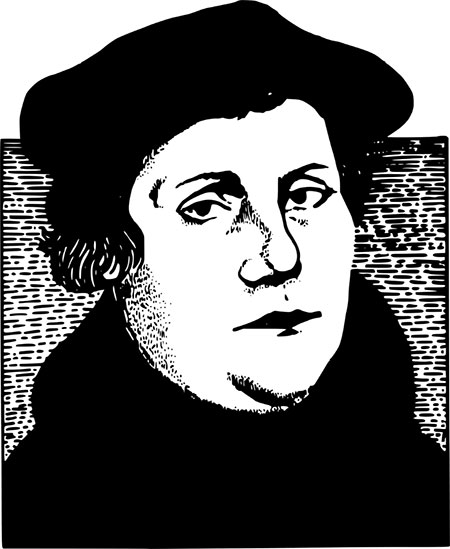Think
Luther's work: a revolution for history
Rodrigo López Soto, student of the double degree Degree in Law and Philosophy of the School of Philosophy y Letras, writes about the transcendence of Luther's work in the configuration of Western thought.

The most widespread historical textbooks, as well as the books we study in schools, coincide in a periodisation that unifies, between the fall of Rome and the Renaissance, the period known as the Age average. Many authors criticise this unification of more than a thousand years of history under a single referential term.
It seems clear that, from the outset, it is intended to be seen as a passing age, as an error, an intermediate human failure between two glorious epochs. Note that it is Age "average", something like a pause in which man came out of the classical light, entered a stage of darkness (intermediate epoch, age average), and would not come out of the darkness until the new light of the Renaissance.
In turn, the end date of this "dark and forgettable era", the era that is by far the least studied in schools, is placed at two possible milestones: the finding of America and the Fall of Constantinople. Of course, both events brought profound change, and their consequences were colossal. But alongside them there is another milestone that brought about an absolute transformation of Western society: the Lutheran Reformation.
accredited specialization This article is not devoted to engage in a 'terminological struggle', but it is worth noting that the general consensus among historians to describe the historical event that began in Wittenberg in 1517 is also worthy of note: it is called the Reformation.
Whether the intention of those reformers (as they are called) was to reform the Church is open to discussion; but if we take the notion of reform as the action of "refund something to its original form", or even as "improving the form of something", it is clear that what took place in 16th century Europe was not a reform of any kind class, but a real revolution.
The revolution initiated by Luther marked the future of what until the Peace of Westphalia (the peace that ended the Thirty Years' War, caused by the break-up) was called Christendom, and which subsequently began to break up until it became generalised as Europe. The work initiated by Martin Luther marked such profound changes in the mentality, politics, spirituality, society, Philosophy and theology of the West that it certainly heralded an epochal change.
It was not a struggle against the abuses of the Church; it was not a cleansing of the prevailing filth. It was a rupture and it was the creation of new dogmas and a new vision of God, the world, the person and his freedom. And such a radical, root change, such a highly modifying product, how can it be considered a "reformation"; why is it not studied as a milestone in the beginning of the Modern Age?
Among these changes brought about by what the Augustinian monk of Wittenberg began is the change of spirituality (and therefore mentality) in Europe, and the subversion of the political over the religious that occurred at the beginning of the Modern Age. What we study at high school as the Ancien Régime, which led to the French Revolution, is unintelligible without Luther. Clear examples are the disputes between Philip the Fair and the Pope, the support that German princes gave to Luther, or the case of Cardinal Richelieu, who fought against Lutheran ideas in France, but then supported Luther in Germany for political interests.
In spiritual and moral matters, Luther defended the thesis of Sola scriptura, according to which there was no other source revelation than the Bible. In addition, man's nature has been so corrupted since original sin that salvation cannot come by works, but only by faith, and it is God who saves those who are convinced of their own salvation. In other words: everyone interprets the Bible as he pleases, and only faith saves.
The logical consequence of this was a moral relativism in northern societies that led everyone to justify his or her own sin, in contrast to what happened in Catholic areas, where everyone recognised his or her own sin on the basis of a common awareness of evil. Luther said, "pecca fortiter, sed crede fortius. (Sin strongly, but believe more strongly)".
The Lutheran pecca fortiter and Sola scriptura led Europe to a gradual change in mentality: first, it is the subject who interprets truth, and it is the subject who is saved, not by his actions, but by his faith; second, it is in the subject that truth is born, and the union between morality and reason is separated; third, there is no objective truth, but truth is subjective, as is morality; finally (and to this day) there is no truth, nor is there morality.
The changes brought about by the Reformation in the West cover practically all areas of human life: spirituality (only faith saves), politics (it is observable in history: gradual secularism throughout Europe), Economics (Protestant principles established the instructions of capitalism), Philosophy and thought, religion, and much more. It is impossible to dwell on them all, and would require much more study on my part. So I conclude by reiterating that the Protestant Revolution (not Reformation) ushered in the Modern Age both by its nature and by its fruits. Fruits that still remain, well rooted, in contemporary Europe.
If you liked the article, you might be interested in one of our Degrees!








